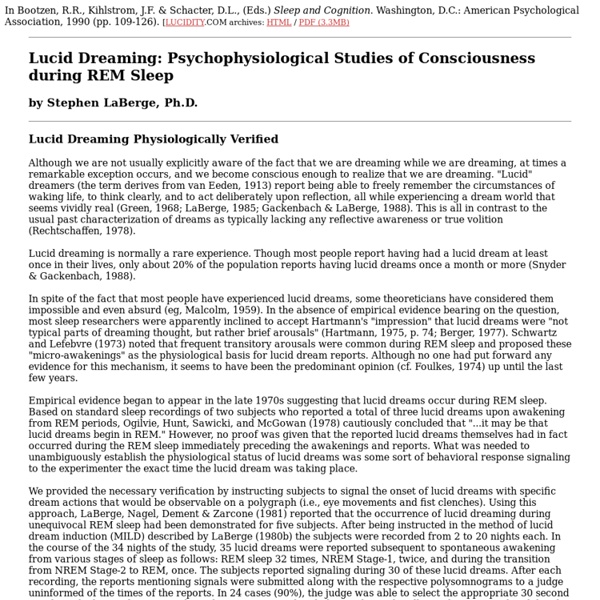Psychophysiology of Lucid Dreaming

http://www.lucidity.com/SleepAndCognition.html
Related: Somnulus
A Good Night's Sleep
Ever since he retired, Edward dreads going to bed at night. He’s afraid that when he turns off his light, he will just lie there with his eyes open and his mind racing. “How can I break this cycle?”
Lucid dream
A lucid dream is any dream in which one is aware that one is dreaming. In relation to this phenomenon, Greek philosopher Aristotle observed: "often when one is asleep, there is something in consciousness which declares that what then presents itself is but a dream".[1] One of the earliest references to personal experiences with lucid dreaming was by Marie-Jean-Léon, Marquis d'Hervey de Saint Denys.[2] Skeptics of the phenomenon suggest that it is not a state of sleep, but of brief wakefulness.[15][16] Others point out that there is no way to prove the truth of lucid dreaming other than to ask the dreamer.[17] Lucid dreaming has been researched scientifically, with participants performing pre-determined physical responses while experiencing a lucid dream.[18][19] Scientific history[edit]
Lucid Dreaming
“It’s the only way to fly.” Lucid dreaming is the experience of being completely aware within a dream that you are, in fact, in a dream. This realization leads to complete power for the dreamer, allowing him/her to go anywhere and do anything in their dream. You might have had this happen to you once or twice in your life, but chances are the dream didn’t last very long. This is because as soon as people get excited from realizing they have achieved lucidity, they tend to wake up.
Lucid dreamers help scientists locate the seat of meta-consciousness in the brain
Studies of lucid dreamers show which centers of the brain become active when we become aware of ourselves in dreams. Which areas of the brain help us to perceive our world in a self-reflective manner is difficult to measure. During wakefulness, we are always conscious of ourselves. In sleep, however, we are not. But there are people, known as lucid dreamers, who can become aware of dreaming during sleep. Studies employing magnetic resonance tomography (MRT) have now been able to demonstrate that a specific cortical network consisting of the right dorsolateral prefrontal cortex, the frontopolar regions and the precuneus is activated when this lucid consciousness is attained.
Melatonin for Treatment of Sleep Disorders: Summary of Evidence Report/Technology Assessment, No. 108
Summary Evidence Report/Technology Assessment: Number 108 This information is for reference purposes only.
Rapid eye movement sleep
Rapid eye movement (REM) sleep is a stage of sleep characterized by the rapid and random movement of the eyes. Rapid eye movement sleep is classified into two categories: tonic and phasic.[1] It was identified and defined by Nathaniel Kleitman and his student Eugene Aserinsky in 1953. Criteria for REM sleep includes rapid eye movement, low muscle tone and a rapid, low-voltage EEG; these features are easily discernible in a polysomnogram,[2] the sleep study typically done for patients with suspected sleep disorders.[3]
Can B6 Keep Me Awake At Night?
Insomnia by Smiley Stew People interested in their dreams have long noted the fascinating relationship between Vitamin B6 and dreams. My own interest in dreams is no exception: one of the earliest blog posts I ever wrote about documented my dream reports after taking B6. It’s something that still intrigues the hell out of me to this day. So why this all fascination with B6?
LUCID DREAMING AS A LEARNABLE SKILL: A CASE STUDY
Sérgio A. Mota-Rolim, John F. Araujo. (2013) Neurobiology and clinical implications of lucid dreaming.
Ecstatic auras, Temporal Lobe Epilepsy, 'Depression'
I am desperate to find some feedback from the community about the specific sensations I experience with my temporal lobe epilepsy. Often my my episodes begin with, slight disorientation, which may if unchecked lead to a dreamlike deja vu that once this far progressed often will lead to an ecstatic feeling of calm and ultimate knowledge. I do not know whether to identify these stages all as partial seizures because there is a definite progression. I say "left unchecked" because I absolutely believe that most at least somewhat are under my control. Depending upon how quickly I recognize what is happening and my mental/physical/emotional state I can halt progression. My first question is whether others feel this control to stop the progression.
Related:



